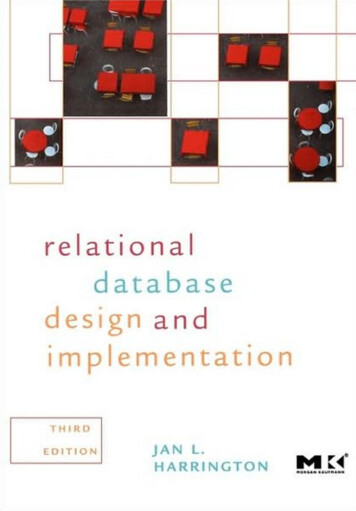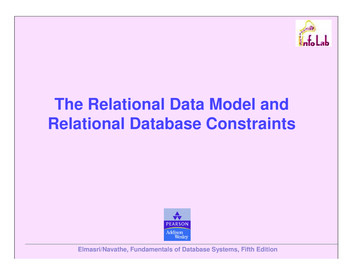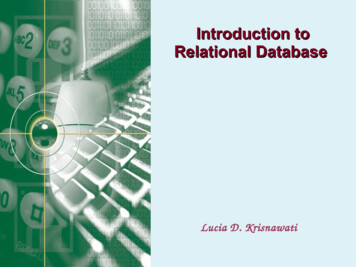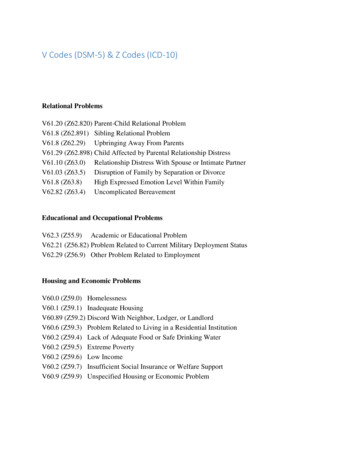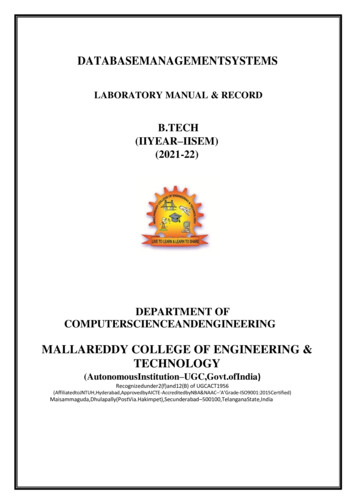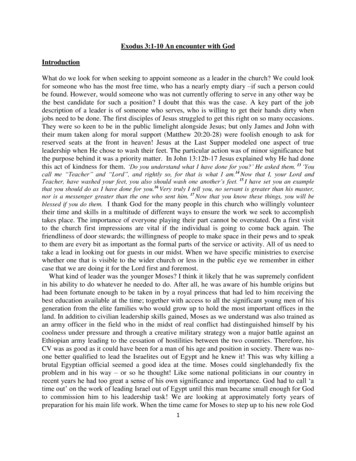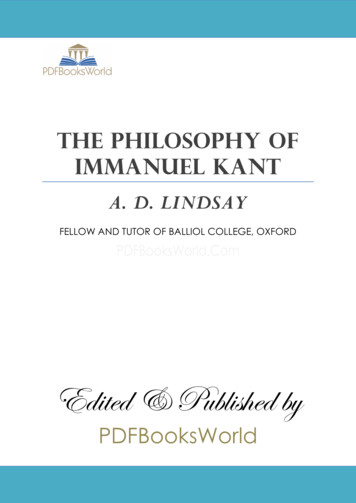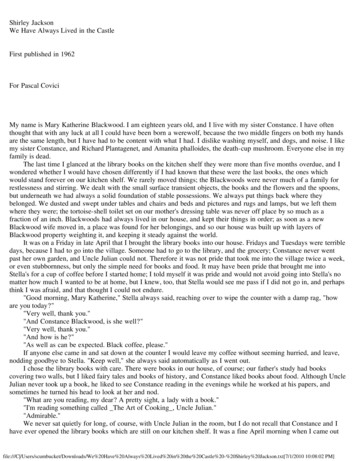
Transcription
A relational encounter: the lived experience ofdirect social work practice with people of refugeebackgroundAnn Joselynn Baltra-Ulloa, BA (Hons) BSW (Hons)A dissertation submitted in fulfilment of the requirements forthe Degree of Doctor of Philosophy (Social Work)University of TasmaniaSeptember, 2014
Declaration of OriginalityThis thesis contains no material which has been accepted for a degree or diplomaby the University or any other institution, except by way of backgroundinformation and duly acknowledged in the thesis, and to the best of my knowledgeand belief no material previously published or written by another person exceptwhere due acknowledgement is made in the text of the thesis, nor does the thesiscontain any material that infringes copyright.Candidate: .Date:ii
Authority of AccessThis Thesis may be available for loan and limited copying and communication inaccordance with Copyright Act 1968.Candidate: .Date:iii
Statement of Ethical ConductThe research associated with this thesis abides by the international and Australiancodes on human and animal experimentation, the guidelines by the AustralianGovernment's Office of the Gene Technology Regulator and the rulings of theSafety, Ethics and Institutional Biosafety Committees of the University.Candidate: .Date:iv
ACKNOWLEDGEMENTSFirst and foremost, none of this work or the privileges and power this workbestows on me, would be possible without the participants, their communities andtheir stories they so generously and humbly shared with me. I don‟t have thewords or means for thanking you in a way that truly honours you all equally. Allthat I can do is make sure this works leads to change. So, I make the promise herethat my professional life is and will be about social justice. Thank you from thebottom of my heart. This work is dedicated to you and the millions of people whodid not make it out of those soul destroying, hell on earth, refugee camps.My sincere appreciation for the supervision I received from ProfessorSandra Taylor and Dr Sonya Stanford. They embarked on this journey with meand I know it was difficult and challenging at times. Thank you for perseveringand believing in me and in the work.Thank you to Professor Martha Kuwee Kumsa for being a mentor, agrandmother and a friend to me through the years. Thank you also to ProfessorMel Gray for your support, guidance and mentorship.Thank you to Mara Schneiders, Debbie Smith and Dr Anne Coleman foralways checking on me, for your impromptu phone calls, emails and visits. Thankyou for teaching me how to have courage, how to stand proud in my own skin andhow to speak my truth. Thank you also to Dr Felicity Picken and BrendanChurchill for your laughter and friendship, your knocks on the door, the countlessv
Saturdays we spent without a life dreaming of what the world was up to while weslaved away at the computer.Thank you Dr Terry Cox and Aunty Phyllis for your love, friendship,warmth and for sharing spirit, wisdom and country with me - you made me feelpart of the family and you offered a home away from home.Susan Neighbour, I have no earthly words to thank you. You areeverything I aspire to be in life.Amira Reindorf, The Williams Family, John Lenga, Juma Piri Piri, SonyaPlitt, Mario Amaya-Bonilla and Aunt Anaelena: thank you for your love,friendship and for walking this journey with me.Thank you Brian Sweeney, you lived this work with me. You helped mefind myself and I can‟t thank you enough for that. You believed in my ability andyou challenged yourself for me and for the things I showed you. You sufferedbecause I needed more than you could give me: I‟m sorry I held on longer that wecould both withstand. Thank you for nursing me when I was ill. Thank you fortaking on my pain as yours at times. Thank you for helping me heal from mymother‟s loss and from the pain of losing my home. Thank you for helping mereconnect with Chile, for helping me learn about what happened, for the films youbrought home and watched with me. Thank you for the books you made me readand all the things you taught me. I‟m sorry I was such a bad student at times.Thank you for working so hard to provide material things I thought would makethings better. Thank you for showing me my dark side and challenging me to ownvi
it. Thank you for connecting me to your culture and this country that is my homenow. Thank you for bringing us to Tasmania and, most of all, for our children –they make everything worth facing.Thank you to my daughters Chloe Nikolaou-Baltra, Bella Sweeney-Baltraand Gabby Sweeney-Baltra. I am sorry for taking so long; I hope this journeymakes sense to you one day. I have to find ways to explain to you why, in myheart, I need to do this work until I die. I love you three so much, everything I doin life I do in the hope of leaving a better world for you and your children. Thankyou for everything you are and bring to this world, I love you all so very much.Thank you Michel Gonzalez, you‟ve made the last bit of the journeybearable. You are like a light at the end of a long dark tunnel. Thank you forgiving love another chance, for putting a smile on my face, a spark in my eyes andhope back in my heart. You are a gift to me and I hope I do well in looking afterit.vii
ABSTRACTWhile there is significant research and theoretical literature both withinAustralia and internationally that relates to social work with people of refugeebackground, there is a lack of empirical research about how direct social workpractice is understood and experienced by both people of refugee background andsocial workers. Using a qualitative phenomenological approach informed bycritical and anti-oppressive theories, I aimed to address this significant gap inempirical knowledge by capturing the lived experience of social work practicewith people of refugee background.My research questioned: how direct social work practice with people ofrefugee background is understood and experienced. Thirty-one participants withinTasmania were recruited through volunteer and snowball sampling and wereinterviewed using a semi-structured interview. The participants were people ofrefugee background, social workers who worked with people of refugeebackground, and, social workers of refugee background. The interviews werethematically analysed.The interview data with people of refugee background revealed bothnegative and positive experiences of social work practice. Experiencing help andchange characterised positive encounters in which social workers wereencountered as friends and partners who worked with the strengths of people ofrefugee background. Negative experiences were characterised by the absence ofhelp, change, friendship and a sense of partnership with the practitioner.viii
Social workers commonly described positive practice as being with peoplethrough their personal relationships with clients. Negative practice involved beingto people. Such negative practice was unreflective, emphasised professionalboundaries and involved regarding people of refugee background as powerless.Finally, for social workers of refugee background, the cultural exchangeexperience was the focus of what, for them, comprised positive practice. Culturalexchange was characterised by reciprocity and mutual learning betweenpractitioner and client. Additionally, the professionalisation of social work wasdescribed as an obstacle to cultural exchange.The study‟s findings highlight the significance for participants of arelational standpoint in direct social work practice with people of refugeebackground, requiring dialogical practices that were derived from and framed byfriendships and partnerships between practitioners and clients. While it isacknowledged that qualitative findings do not easily lend themselves togeneralisation, possible implications for practice are that social work needs tocontend with how relationships with clients are understood as friendships anddeveloped through reciprocity, dialogue and mutual learning. Further research iswarranted to explore how to integrate these findings into the learning and practiceof social work with people of refugee background.ix
TABLE OF CONTENTSDeclaration of Originality . iiAuthority of Access. iiiStatement of Ethical Conduct. ivACKNOWLEDGEMENTS . vABSTRACT . viiiList of Tables and Figures . xxiCHAPTER ONE . 11.1 Introduction . 11.2 Background and Context: Rationale . 21.3 The Personal is Political – A Personal Journey with PoliticalImplications . 51.4 Aims and Significance . 101.5 Choosing the Research Paradigm. 121.5.1 The Influences of Critical Theory . 121.5.2 The Influences of Anti-oppressive Theory . 171.5.3 The Use of Terminology . 20x
1.6 Structure of the Thesis . 241.7 Conclusion . 25CHAPTER TWO . 26Literature Review: Understanding and Responding to People of RefugeeBackground in Australian Direct Social Work Practice . 262.1 Introduction . 262.2 The Contexts of Refugee Resettlement in Australia . 272.3 How Social Work Understands and Responds to People of RefugeeBackground in Australia . 322.3.1 Immigration and Refugee Policies: their Impact on theResettlement Experiences of People of Refugee Background and SocialWork Practice in Australia . 342.3.2 The Refugee and Resettlement Experiences of People ofRefugee Background in Australia . 382.3.3 Understanding Refugees as Traumatised Victims . 432.3.4 Culturally Competent and Sensitive Approaches to Social WorkPractice with People of Refugee Background . 492.3.5 Critiquing the Relevance of Culturally-Competent and SensitiveApproaches to Social Work practice with People of Refugee Background. 57xi
2.4 New Ways of Understanding and Responding to People of RefugeeBackground in Direct Social Work Practice in Australia . 612.4.1 The Indigenisation of Social Work . 632.4.2 The Decolonisation of Social Work . 652.4.3 The Lived Experiences of Social Workers Working with Peopleof Refugee Background. 672.4.4 The Lived Experiences of People of Refugee BackgroundWorking with Social Workers . 692.5 Conclusion . 70CHAPTER THREE. 72Research Methods that Honour the Lived Experience . 723.1 Introduction . 723.2 Aims of the Research . 733.3 Research Questions . 733.4 Research Design . 743.5 Methodology . 743.5.1 Phenomenological and Qualitative Approaches . 743.5.2 Critical and Anti-oppressive Influences . 77xii
3.5.3 Being an Insider and Outsider in the Research . 793.6 Data Collection. 823.6.1 Eligibility of Participants . 823.6.2 Sampling . 843.6.3 Recruiting People of Refugee Background . 853.6.4 Recruiting Social Workers . 883.6.5 Semi-structured Interviews . 893.7 Data Analysis . 913.8 Validity and Trustworthiness of Data . 923.9 Ethical Considerations . 943.9.1 Ethical Considerations regarding Participants of RefugeeBackground . 943.9.2 Ethical Considerations regarding Social Workers . 983.10 Conclusion . 99CHAPTER FOUR . 101Findings from People of Refugee Background . 1014.1 Introduction . 1014.1.1 Overview of Chapter Four . 101xiii
4.2 The Nature of the Positive Social Work Encounter . 106A1. Experiencing Help . 107A2. Experiencing Change . 109A3. Experiencing Friendships . 112A3a. Valuing Culture in Friendships . 115A3b. Friendships as Partnerships . 116A4. The Bridging of Cultural Differences . 118A5. Feeling Assisted in Integrating to Australian Society . 1204.3 The Nature of the Negative Social Work Encounter . 122B1. Being Dominated by Rules and Boundaries . 122B2. A Professionalised Approach that Promotes Boundaries . 123B3a. Feeling Invisible and Irrelevant . 126B3b. Feeling Forced to Integrate into Australian Society . 1284.4 Conclusion . 129CHAPTER FIVE . 131Findings from Social Work Participants . 1315.1 Introduction . 131xiv
5.2 Being and Doing with Clients as the Preferred Social Work PracticePosture . 134A1a. Being and Doing with Clients: Aligned with Core Social WorkValues. 135A1b. Being and Doing with Clients: Appreciative of Culture . 136A1c. Being and Doing with Clients: Derived from PersonalRelationships with Clients . 138A2a. A Relationship Built on Dialogue . 141A2b. A Relationship Built on Mutuality . 142A3a. Tools for Being and Doing with Clients - Advocacy andActivism . 143A3b. Advocacy and Activism: Preparedness in Practice . 144A3c. Advocacy and Activism: Being Creative and Innovative . 145A3d. Advocacy and Activism: Aligning Practice and Values . 147A3e. Tools for Being and Doing with Clients - Two-way Learning. 148A3f. Tools for Being and Doing with Clients - Educating . 1505.3 Being and Doing to Clients as a Type of Social Work Practice . 152B1a. Being and Doing to Clients: Overlooking Culture . 155xv
B1b. Being and Doing to Clients: A Professionalised Relationshipwith Clients Characterised by Boundaries, Emotional Detachment and anExpert Stance . 157B2a. Being and Doing to Clients: Understandings of Clients asPowerless . 162B2b. Being and Doing to Clients: Unreflective Practice . 163B2c. Being and Doing to Clients: Culture of Niceness in Social Work. 164B3a. Paternalism as a Key Element and Outcome of Being and Doingto Clients . 166B3b. Assimilation as a Key Element and Outcome of Being andDoing to Clients . 1675.4 Conclusion . 170CHAPTER SIX . 172Findings from Social Workers of Refugee Background . 1726.1 Introduction . 1726.2 The Nature of Social Work Practice: A Practice of CulturalExchanges . 174A1. Bicultural Practice . 177A2. Sensitivity to Clients and their Context. 180xvi
A3a. The Practice Skill of Flexibility . 182A3b. The Practice Skill of Sharing Information . 183A3c. The Practice Skill of Listening . 1856.3 The Challenges of Cultural Exchange Social Work Practice withPeople of Refugee Background . 187B1a. The Impact of Professionalisation . 187B1b. The Impact of Other Social Work Practice Approaches . 1916.4 Conclusion . 192CHAPTER SEVEN. 194Discussion of Findings . 1947.1 Introduction . 1947.2 Participants of Refugee Background – The Positive and theNegative Social Work Encounter . 1957.3 Social Work Participants – The Values of Practice with People ofRefugee Background . 2047.3.1 Being With the Client of Refugee Background . 2067.3.2 The Nature of Relationships in the Being With Clients PracticeExperience . 207xvii
7.3.3 The Role of Dialogue and Mutuality in the Being With ClientsPractice Experience . 2107.3.4 Tools for Practising the Being With Clients . 2117.3.5 The Being To the Client of Refugee Background . 2147.4 Social Workers of Refugee Background – The Cultural ExchangeExperience of Social Work . 2197.5 The Relational Standpoint for Direct Social Work Practice withPeople of Refugee Background . 2237.6 Conclusion . 231CHAPTER EIGHT . 232Conclusion . 2328.1 Introduction . 2328.2 Implications for Social Work Theory and Practice . 2328.3 Implications for Social Work Education . 2418.4 Implications for Future Social Work Research . 2478.5 Limitations of the Study . 2498.6 Conclusion . 2508.7 Final Summary . 252xviii
REFERENCE LIST . 254APPENDICES . 268Appendix 1: Recruitment Poster for Participants of RefugeeBackground . 268Appendix 2: Preamble (via e-mail or letter) to relevant agencies seekingtheir support in distributing research recruitment poster . 269Appendix 3: Telephone and E-mail protocol for first contact made by apotential participant of Refugee background . 271Appendix 4: Information sheet for Research Participants from Refugeecommunities . 272Appendix 5: Participant of Refugee Background Consent Form. 281Appendix 6: Interview Schedule for Participants of RefugeeBackground . 283Appendix 7: Recruitment Poster for Social Work Participants . 284Appendix 8: Telephone and E-mail protocol for first contact made by apotential social work participant . 285Appendix 9: Information Sheet for Social Work Research Participants. 286Appendix 10: Social Workers Consent Form . 295Appendix 11: Social Workers Interview Schedule . 297xix
Appendix 12: Thematic Map of Responses . 298Appendix 13: Letter enclosed with posted information offering oralconsent and/or the use of an Interpreter. . 299xx
List of Tables and FiguresTable 1: Profile of People of Refugee Background Interviewees(Group A) . 102Table 2: Profile of Social Work Interviewees (Group B). . 102Table 3: Profile of Social Work interviewees who were also of RefugeeBackground (Group C). . 103Table 4: Frequency of themes and sub-themes amongst responses fromGroup A participants . 105Table 5: Frequency of themes and sub-themes amongst responses fromGroup B participants . 133Table 6: Frequency of themes amongst responses from Group Cparticipants. . 174Figure 1: The elements of the relational standpoint in direct social workpractice with people of refugee background . 225xxi
CHAPTER ONE“Step into my shoes and ask me questions, walk along with me ”1.1 IntroductionBeing of refugee background in Australia is an experience outside of thesocial and cultural compass of the majority of Australians. Indeed much of whatwe know, as an Australian community, about being a person of refugeebackground living in Australia derives not from hearing their stories and „steppinginto their shoes‟ but from the political agenda delivered directly to our livingrooms by the media (Power 2010). Given this context, it is not surprising that, asMeemeduma (1993, p. 248) points out, social work as a profession struggles to„get it right‟ with refugee communities living in Australia.My thesis was conceived as an initial step towards „getting it right‟ indirect social work practice with people of refugee background in Australia. It hasbeen conceived as a process of engaging with grounded stories from both peopleof refugee background and social workers who have worked with them in order tounderstand and learn from their lived experiences of practice. This thesis creates aspace for honouring unheard stories and for learning anew that which will help us,as a community, to get to know one another.This chapter is the first of two dedicated to providing the context of andbackground to the study. In this chapter, I begin by outlining the background and1
context of the research. That is, I tell the story of my own experience as a socialworker of refugee background and how these experiences prompted me to thinkabout the lived experience of direct social work practice with people of refugeebackground. The aims of the study, its significance to the social work field and thereasons for conducting the study are then presented. A detailed description of theparadigm underpinning this study is provided, including a discussion of theinfluences of critical theory and anti-oppressive thought. The use of terminologythroughout this thesis and my approach to the use of language concludes thesediscussions. Finally, the structure of the thesis is described and is followed bybrief concluding comments that foreground the second chapter – the review ofrelevant literature.1.2 Background and Context: RationaleMy interest in social work practice with people of refugee backgroundemerges from the identity that I occupy as a person of refugee background, mypractice experiences with refugee communities and the work that I do inintercultural education. My reading of cross-cultural social work literature, mypractice experiences of social work with people of refugee background and myreflections on practice have led me to observe some problems within this field ofpractice. Social workers‟ practice is currently informed by bodies of knowledgesuch as the Australian Association of Social Workers (AASW) Code of Ethics(2010); anti-oppressive and anti-racist social work practice theory; anoverabundance of cultural knowledge about cultural groups (Gray, Coates andYellow Bird 2008); and, values and skills learnt through ever-popular cultural2
competence training offered across the spectrum of health and human services.However, in spite of this current range of resources to draw on, I have heardsocial workers speak of how they struggle to feel relevant as helpers whenworking with people of refugee background.Similarly, in my years of social work practice, being involved incommunity activism and growing up within a racialised minority, I have heardpeople of refugee background say about social workers: “they are nothelpful they don‟t understand I‟m not from here”. In discussions with refugeecommunities, I have often heard it said that “if a social worker is trained to helppeople who are homeless, mentally ill, suicidal, chronically poor, chronicallyexcluded, abused, neglected, [then] why do they struggle to be helpful to peopleof refugee background?” As a social worker, I have not been able to answer thesequestions.Furthermore, I‟m not alone in observing that social workers prefer torespond to practice challenges through standardised formulae and approaches(Gray, Coates and Yellow Bird
empirical knowledge by capturing the lived experience of social work practice with people of refugee background. My research questioned: how direct social work practice with people of refugee background is understood and experienced. Thirty-one participants within Tasmania were r


